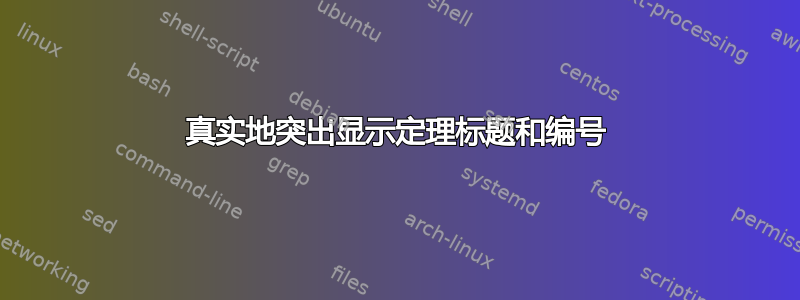
最近我遇到了这个关于 LaTeX 中酷炫文本高亮的精彩帖子以及 @Antal Spector-Zabusky 的相应回答。我确实想在我的讲义中实现这种突出显示。特别是我定义了多个环境(如定义、备注和命题)(使用mdframed和amsthm)。
这是一个最小的例子
\documentclass{report}
\usepackage{amsthm}
\usepackage{xcolor}
\usepackage{mdframed}
\definecolor{superlight}{HTML}{F5F5F5}
\mdfdefinestyle{basic-gray-box}{backgroundcolor=superlight}
\setlength{\parindent}{0pt}
\newtheoremstyle{mystyle}
{}
{}
{\itshape}
{}
{\bfseries}
{.}
{ }
{\thmname{\highlight{#1}}\thmnumber{ #2}\thmnote{ (#3)}}%
\theoremstyle{mystyle}
\newmdtheoremenv[style=basic-gray-box]{proposition}{Satz}[chapter]
% Highlight
\usepackage{soul}
\usepackage{tikz}
\usetikzlibrary{calc}
\usetikzlibrary{decorations.pathmorphing}
\makeatletter
\newcommand{\defhighlighter}[3][]{%
\tikzset{every highlighter/.style={color=#2, fill opacity=#3, #1}}%
}
\defhighlighter{yellow}{.5}
\newcommand{\highlight@DoHighlight}{
\fill [ decoration = {random steps, amplitude=2pt, segment length=15pt}
, outer sep = -30pt, inner sep = 0pt, decorate
, every highlighter, this highlighter ]
($(begin highlight)+(0,8pt)$) rectangle ($(end highlight)+(0,-3pt)$) ;
}
\newcommand{\highlight@BeginHighlight}{
\coordinate (begin highlight) at (0,0) ;
}
\newcommand{\highlight@EndHighlight}{
\coordinate (end highlight) at (0,0) ;
}
\newdimen\highlight@previous
\newdimen\highlight@current
\DeclareRobustCommand*\highlight[1][]{%
\tikzset{this highlighter/.style={#1}}%
\SOUL@setup
%
\def\SOUL@preamble{%
\begin{tikzpicture}[overlay, remember picture]
\highlight@BeginHighlight
\highlight@EndHighlight
\end{tikzpicture}%
}%
%
\def\SOUL@postamble{%
\begin{tikzpicture}[overlay, remember picture]
\highlight@EndHighlight
\highlight@DoHighlight
\end{tikzpicture}%
}%
%
\def\SOUL@everyhyphen{%
\discretionary{%
\SOUL@setkern\SOUL@hyphkern
\SOUL@sethyphenchar
\tikz[overlay, remember picture] \highlight@EndHighlight ;%
}{%
}{%
\SOUL@setkern\SOUL@charkern
}%
}%
%
\def\SOUL@everyexhyphen##1{%
\SOUL@setkern\SOUL@hyphkern
\hbox{##1}%
\discretionary{%
\tikz[overlay, remember picture] \highlight@EndHighlight ;%
}{%
}{%
\SOUL@setkern\SOUL@charkern
}%
}%
%
\def\SOUL@everysyllable{%
\begin{tikzpicture}[overlay, remember picture]
\path let \p0 = (begin highlight), \p1 = (0,0) in \pgfextra
\global\highlight@previous=\y0
\global\highlight@current =\y1
\endpgfextra (0,0) ;
\ifdim\highlight@current < \highlight@previous
\highlight@DoHighlight
\highlight@BeginHighlight
\fi
\end{tikzpicture}%
\the\SOUL@syllable
\tikz[overlay, remember picture] \highlight@EndHighlight ;%
}%
\SOUL@
}
\makeatother
\begin{document}
\chapter{}
What the highlighting looks like:
\begin{proposition}\end{proposition}
What I want it to look like: \\
\textbf{\highlight{Satz 1.1. (my title)}}
\end{document}
这将生成如下文档:
特别要注意的是,突出显示中的“随机性”被删除了(它只是一个围绕“Satz”的透明框)。我还希望突出显示涵盖整个标题(Satz、编号、名称)。
我该如何处理这个问题?
答案1
这是一个扩展问题。您需要首先扩展参数\highlight。这里有一种方法可以做到这一点。它定义一个变体,,\Highlight它首先扩展参数。(当然还有其他方法,例如使用\expandafter。)
\documentclass{report}
\usepackage{amsthm}
\usepackage{xcolor}
\usepackage{mdframed}
\definecolor{superlight}{HTML}{F5F5F5}
\mdfdefinestyle{basic-gray-box}{backgroundcolor=superlight}
\newcommand\Highlight[1]{\edef\temp{\noexpand\highlight{#1}}%
\temp}
\setlength{\parindent}{0pt}
\newtheoremstyle{mystyle}
{}
{}
{\itshape}
{}
{\bfseries}
{.}
{ }
{\Highlight{\thmname{#1}\thmnumber{ #2}\thmnote{ (#3)}}}%
\theoremstyle{mystyle}
\newmdtheoremenv[style=basic-gray-box]{proposition}{Satz}[chapter]
% Highlight
\usepackage{soul}
\usepackage{tikz}
\usetikzlibrary{calc}
\usetikzlibrary{decorations.pathmorphing}
\makeatletter
\newcommand{\defhighlighter}[3][]{%
\tikzset{every highlighter/.style={color=#2, fill opacity=#3, #1}}%
}
\defhighlighter{yellow}{.5}
\newcommand{\highlight@DoHighlight}{
\fill [ decoration = {random steps, amplitude=2pt, segment length=15pt}
, outer sep = -30pt, inner sep = 0pt, decorate
, every highlighter, this highlighter ]
($(begin highlight)+(0,8pt)$) rectangle ($(end highlight)+(0,-3pt)$) ;
}
\newcommand{\highlight@BeginHighlight}{
\coordinate (begin highlight) at (0,0) ;
}
\newcommand{\highlight@EndHighlight}{
\coordinate (end highlight) at (0,0) ;
}
\newdimen\highlight@previous
\newdimen\highlight@current
\DeclareRobustCommand*\highlight[1][]{%
\tikzset{this highlighter/.style={#1}}%
\SOUL@setup
%
\def\SOUL@preamble{%
\begin{tikzpicture}[overlay, remember picture]
\highlight@BeginHighlight
\highlight@EndHighlight
\end{tikzpicture}%
}%
%
\def\SOUL@postamble{%
\begin{tikzpicture}[overlay, remember picture]
\highlight@EndHighlight
\highlight@DoHighlight
\end{tikzpicture}%
}%
%
\def\SOUL@everyhyphen{%
\discretionary{%
\SOUL@setkern\SOUL@hyphkern
\SOUL@sethyphenchar
\tikz[overlay, remember picture] \highlight@EndHighlight ;%
}{%
}{%
\SOUL@setkern\SOUL@charkern
}%
}%
%
\def\SOUL@everyexhyphen##1{%
\SOUL@setkern\SOUL@hyphkern
\hbox{##1}%
\discretionary{%
\tikz[overlay, remember picture] \highlight@EndHighlight ;%
}{%
}{%
\SOUL@setkern\SOUL@charkern
}%
}%
%
\def\SOUL@everysyllable{%
\begin{tikzpicture}[overlay, remember picture]
\path let \p0 = (begin highlight), \p1 = (0,0) in \pgfextra
\global\highlight@previous=\y0
\global\highlight@current =\y1
\endpgfextra (0,0) ;
\ifdim\highlight@current < \highlight@previous
\highlight@DoHighlight
\highlight@BeginHighlight
\fi
\end{tikzpicture}%
\the\SOUL@syllable
\tikz[overlay, remember picture] \highlight@EndHighlight ;%
}%
\SOUL@
}
\makeatother
\begin{document}
\chapter{}
What the highlighting looks like:
\begin{proposition}[my title]
\end{proposition}
What I want it to look like: \\
\textbf{\highlight{Satz 1.1. (my title)}}
\end{document}
要将点放在突出显示区域的顶部,您可以使用
\documentclass{report}
\usepackage{amsthm}
\usepackage{xcolor}
\usepackage{mdframed}
\definecolor{superlight}{HTML}{F5F5F5}
\mdfdefinestyle{basic-gray-box}{backgroundcolor=superlight}
\newcommand\Highlight[1]{\edef\temp{\noexpand\highlight{#1}}%
\temp}
\setlength{\parindent}{0pt}
\newtheoremstyle{mystyle}
{}
{}
{\itshape}
{}
{\bfseries}
{\hspace*{-1ex}.}
{ }
{\Highlight{\thmname{#1}\thmnumber{ #2}\thmnote{ (#3)}~}}%
\theoremstyle{mystyle}
\newmdtheoremenv[style=basic-gray-box]{proposition}{Satz}[chapter]
% Highlight
\usepackage{soul}
\usepackage{tikz}
\usetikzlibrary{calc}
\usetikzlibrary{decorations.pathmorphing}
\makeatletter
\newcommand{\defhighlighter}[3][]{%
\tikzset{every highlighter/.style={color=#2, fill opacity=#3, #1}}%
}
\defhighlighter{yellow}{.5}
\newcommand{\highlight@DoHighlight}{
\fill [ decoration = {random steps, amplitude=2pt, segment length=15pt}
, outer sep = -30pt, inner sep = 0pt, decorate
, every highlighter, this highlighter ]
($(begin highlight)+(0,8pt)$) rectangle ($(end highlight)+(0,-3pt)$) ;
}
\newcommand{\highlight@BeginHighlight}{
\coordinate (begin highlight) at (0,0) ;
}
\newcommand{\highlight@EndHighlight}{
\coordinate (end highlight) at (0,0) ;
}
\newdimen\highlight@previous
\newdimen\highlight@current
\DeclareRobustCommand*\highlight[1][]{%
\tikzset{this highlighter/.style={#1}}%
\SOUL@setup
%
\def\SOUL@preamble{%
\begin{tikzpicture}[overlay, remember picture]
\highlight@BeginHighlight
\highlight@EndHighlight
\end{tikzpicture}%
}%
%
\def\SOUL@postamble{%
\begin{tikzpicture}[overlay, remember picture]
\highlight@EndHighlight
\highlight@DoHighlight
\end{tikzpicture}%
}%
%
\def\SOUL@everyhyphen{%
\discretionary{%
\SOUL@setkern\SOUL@hyphkern
\SOUL@sethyphenchar
\tikz[overlay, remember picture] \highlight@EndHighlight ;%
}{%
}{%
\SOUL@setkern\SOUL@charkern
}%
}%
%
\def\SOUL@everyexhyphen##1{%
\SOUL@setkern\SOUL@hyphkern
\hbox{##1}%
\discretionary{%
\tikz[overlay, remember picture] \highlight@EndHighlight ;%
}{%
}{%
\SOUL@setkern\SOUL@charkern
}%
}%
%
\def\SOUL@everysyllable{%
\begin{tikzpicture}[overlay, remember picture]
\path let \p0 = (begin highlight), \p1 = (0,0) in \pgfextra
\global\highlight@previous=\y0
\global\highlight@current =\y1
\endpgfextra (0,0) ;
\ifdim\highlight@current < \highlight@previous
\highlight@DoHighlight
\highlight@BeginHighlight
\fi
\end{tikzpicture}%
\the\SOUL@syllable
\tikz[overlay, remember picture] \highlight@EndHighlight ;%
}%
\SOUL@
}
\makeatother
\begin{document}
\chapter{}
What the highlighting looks like:
\begin{proposition}[my title]
blub bla blub
\end{proposition}
What I want it to look like: \\
\textbf{\highlight{Satz 1.1. (my title)}}
\end{document}





